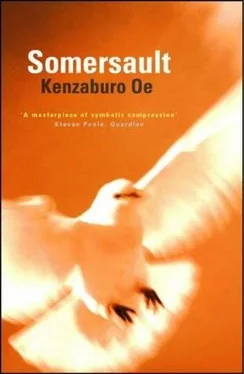But now aren't you a little nostalgic when it comes to her?" Kizu asked excitedly. "You want to start a new life, right? Aside from the question of being a free man, this might be a good opportunity for you. Think about it.
11 s pretty extraordinary for that one day in the past to come back to life at a single stroke for three people. Why don't we invite her for dinner? Consid- ering the dramatic way you two first met, how could she pass up the chance f°r a reunion? We can use this sketch as a thank-you present."
The young girl, who fifteen years before had been pierced by Ikuo's plastic model and yet managed painfully to maintain her balance, was now of course a grown woman, and when Kizu's invitation came she readily ac- cepted. Kizu was overjoyed to hear her say that after his first phone call to her she had remembered everything that happened on that long-ago day. She hastened to add that she was working now in the office of a religious move- ment and wouldn't be able to spare much time. She asked if they could meet during her lunch break, near the Seijo Gakuenmae Station, not far from her office.
The way she responded was so typical of this new generation of Japa- nese, Kizu mused, for when he invited her out for a meal she immediately asked if she could go ahead and make a reservation in a French restaurant she knew. They decided on a date and time, and the next day a fax arrived for Kizu with a map indicating landmarks such as an old Catholic church and the route the buses take to Shibuya, as well as a photo of the restaurant itself, an old-style former Japanese residence with a large zelkova tree in front.
On Friday the three of them settled into their seats at the restaurant under a clear plastic roof and the lush foliage of the zelkova branches. The young woman sat by the window on one side, with Kizu seated across from her and Ikuo by his side.
"The way I remember you," Kizu said to her, unwrapping the sketch from its cardboard cover, "is shown in this sketch, but I can still see traces of the young girl in you."
The young woman, glistening chestnut hair cascading past her shoul- ders, gazed at the sketch, her mouth exactly as Ikuo remembered it, lips slightly parted. She straightened her thin cylindrical neck and looked at Ikuo.
"As soon as we met today," she said, "I knew you were that frightening young boy. I remember you very well."
Ikuo was overwhelmed, and Kizu interceded.
"Ikuo's looks were definitely special from the time he was in grade school.
When I met him again for the first time in fifteen years, it took me a while to recognize him, though subconsciously I think I was aware of who he was."
Ikuo, blushing, turned his face from both of them. Kizu was reminded of the head of a young bull. The young woman, too, seemed to enjoy looking at him. The waiter came to tell them the lunch specials, and Kizu, constantly amazed at the high prices of wine in Tokyo, studied the wine list and ordered a California brand.
"I know you were a member of the ballet team that was going to per- form at the awards ceremony," Kizu said, "and I understand, from what some- one at the newspaper told me, that you're still involved in dance."
"I study under a teacher in India, but I'm only able to go once a year for five weeks. I've given a few recitals in Tokyo, but mainly I'm just doing it for my own amusement."
"Then how do you know when you're making progress?" Ikuo asked, his large eyes fixed on her face.
Kizu was astonished at the unexpected question, but the young woman was unfazed. It had been sprinkling when they entered the restaurant, and now the rain was coming down hard on the zelkova.
The young woman looked up at the water dripping off the clear roof.
"It's true my dance teacher lives far away," she said, "but right next to me I have two teachers who instruct me in much more important things. They're kind enough to make time each day to talk with me, though one of them is sick right now… I'm sure you heard from the reporter about the people I work for now, Patron and Guide?"
Shedi rected this question to Kizu. He nodded. The waiter poured him a glass of Napa Valley white wine, a type he'd often had in America, and turned a curious look at the young woman when she mentioned these un- usual names. Ikuo, face red, shot him an intentionally cruel, violent look that rnade Kizu shudder when he imagined the potential for violence underlying his own relationship with Ikuo these past two months. However, the one who most clearly felt the danger inherent here was the waiter, Ikuo's contempo- rary; after he finished pouring the wine he scurried off as if he had a sail attached to him and the wind at his back.
Only the young woman seemed unperturbed. She must have sensed the unusual roughness in Ikuo and seen the way the waiter acted, like a beaten dog with his tail between his legs, yet she didn't flinch or even seem tense.
"The names Patron and Guide are a little unusual," she said calmly, "and people who don't know about the incident they were involved in tend not to want to have anything to do with them. People who actually meet them, though, find them quite extraordinary. To give you an example, my Indian dance teacher doesn't dance himself anymore, but once he accompanied a dance troupe he used to choreograph, a troupe that's become one of the main- stays of Indian dance, on a trip to Japan. I'd been going to his dance seminar in Madras since I was in high school, and my teacher was worried when he heard I wasn't studying under a dance teacher here but was living with these religious leaders. When he came to see Patron, Guide, and me at our place, though, he was impressed."
"By Patron?" Ikuo asked, his face no longer red.
"By both of them. He said that in Indian mythology there's a duo much like them."
"You mean playing the roles of Patron and Guide?"
"Not exactly. I think he meant their faces, bodies, the way they talk and move and walk. The combination of the two of them."
"Since your teacher's a dance teacher then, he can perceive the secrets hidden behind physical movement?"
"Physical expression, you might call it," the young woman answered.
"He can detect the inner being of people by how they move. He showed a lot of respect for Patron and Guide and even danced for them in the annex they built for me to practice dance in. The teacher's students, the musicians who accompanied him, were quite bowled over. They hadn't seen him dance for ages."
"Did those students accompany him?" Kizu asked. "Maybe they had some premonition that he was going to dance."
"When I saw that they'd brought their instruments, I had a feeling that maybe he would dance. I mean, what with meeting Patron and Guide and all. Maybe he sensed this and had his students prepare for it."
Several varieties of intricate dessertlike hors d'oeuvres were brought to their table. Ikuo polished off one dish in a single bite and turned to the next.
The young woman possessed a healthy appetite too, assimilating the fuel she needed like an automatic machine.
Next they were served foie gras topped by a dark wine-colored sauce.
The waiter had made a point of emphasizing that it was flown in from France.
Ikuo gobbled his up quickly, and Kizu transferred his own to Ikuo's plate, eating instead some warmed vegetables he'd covered with the sauce. The young woman gazed at this, her mouth slightly open in what seemed to be her usual expression as she pondered things.
"I don't like Patron eating rich foods either," she said.
After this, they ate the final dish in silence-a moose steak that, by chance, they had all ordered from the two choices on the menu. Kizu followed the young people's lead. Ikuo must have been mulling over things to say while they ate, for just as they began their after-dinner coffees he burst out again with an unexpected question.
Читать дальше





